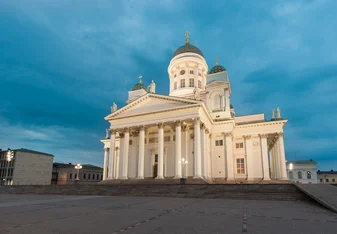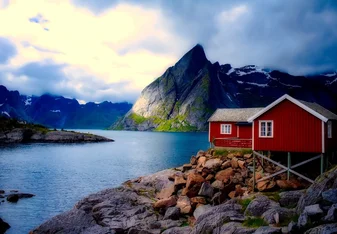Internships in Iceland
About
With stunning landscapes of active volcanoes, sand fields, endless mountain ranges, vast glaciers, and other geographic characteristics, Iceland has become one of the most desirable tourist destinations. But if you want to get to know this small Nordic island, with a humble population of around 330,000 people, in a more intimate way and gain valuable work experience, an internship is a great option.
One of the safest countries in the world with a high standard of living, this country is ideal to gain experience in the field of your interest. However, interning in Iceland will never just be about the work experience, but it's also all about getting to explore the land of fire and ice, from the volcanoes to the glaciers, and learning about the culture as one of the most ethnically homogenous countries in the world.
Top Industries
Interning in Iceland is best for those interested in the tourism or hospitality industries or sciences, particularly marine biology or ecology, geology, or forestry.
The tourism boom in Iceland has created an abundance of internship opportunities in tourism and hospitality, many of these opportunities taking place in the capital city of Reykjavik, but some also available in more remote tourist destinations. Iceland's coastal towns with large fishing industries provide internships in marine biology and ecology, while the interior areas of the island are most common for geology and forestry.
Tourism & Hospitality
The tourism and hospitality industries in Iceland are huge, and continually growing with the increase in tourist demand. Partially due to Iceland's natural beauty, which makes it a very appealing tourist destination, and partially due to airlines such as Wow Air and Icelandic Air increasingly adding affordable flights to Iceland, international travelers are flocking to this country like never before. If you are interested in working in tourism or hospitality, there a plenty of ways to intern in these industries in Iceland. Options include hotel and restaurant work and working for outdoor tourist activities and tour groups. Within the field of tourism and hospitality, marketing and PR internships are common.
Marine Biology
Certain areas in Iceland have large fishing industries, providing many internships in fishery work, marine research in ecology and biology, and marine conservation. Ísafjörður in the Westfjords region of northwest Iceland is a common location for these types of internships as it is a coastal town with a large fishing and marine biology industry. Húsavík, a coastal town in northern Iceland, is another popular location for marine research (and optimal whale-watching).
Forestry & Geology
Although most of the populated areas of Iceland are on the coast, due to a government-sponsored project, reforestation has taken root within the interior of Iceland. This has created opportunities to intern in forestry and agriculture. There are also opportunities to intern in geology, many of which take place in the interior of the island as well, such as in Vatnajökull National Park, a 14,000 sq km glacier national park with active geothermal areas, ice caves, massive glaciers, and a glacial lagoon with icebergs.
Planning Your Internship
One of the biggest shocks foreigners have to get used to when spending time in Iceland is the weather and daylight hours. During the winter months, Iceland experiences 21 hours a day of darkness and near-arctic cold, while in the summer, the warm weather is perfect for outdoor activities, and the sun is only down from around midnight until 3am. English is commonly spoken throughout Iceland, so you do not have to worry about struggling to communicate with your co-workers and other Icelanders.
Best Time to Get an Internship in Iceland
It is possible to get an internship any time of year in Iceland, but many industries are more bustling in the spring, summer, and autumn months, rather than the thick of winter.
Tourism and hospitality are at their high points during the warmer months, when travelers can enjoy the natural beauty and partake in outdoor activities such as hiking, biking, and bathing in geothermal pools. However, there is a contingency of tourists who come in the colder months to see the northern lights, so tourism opportunities will be available, though not as widely, during the winter as well.
Housing
Your type of accommodation will vary greatly based on where you are located within Iceland. If you are interning in Reykjavik or another city, you will typically be responsible for finding your own apartment to rent or sublet. If you are doing some sort of environmental or tourist work in a more remote area, housing may be provided or you will at least receive assistance finding housing, as there will simply be less options available. In these remote areas, you may be placed in a shared volunteer house with other volunteers/interns.
Cost of Living
The cost of living in Iceland is quite expensive. The average rent for a one-bedroom apartment in downtown Reykjavik is $990 monthly. Food is also pricey and a decent part of your budget should be carved out for it. Most of the internships in Iceland are unpaid, but you might be offered a living stipend for food, housing, and/or transportation.
Visas
Visas are not required for stays less than 90 days, but if you are planning on staying longer than this, you will need to apply for a tourist or business visa.
Work Culture
Interning in Iceland is ideal for someone who is self-motivated and works well with a flexible schedule. Coffee culture is huge in Iceland and it is common for people to take a break once or twice during the workday to go to a local café. During the summer months, people often take a break during their workday to take a walk or hike. With so many hours of sunlight during the summer, it's not uncommon for the workday to extend well past 5pm, especially since people will take hiking and café breaks during the day.
Health & Safety
Iceland is regarded as one of the safest countries in the world. The crime rate is extremely low and police are regarding with extremely high respect and trust. In terms of health, medical care in Iceland is of high quality, however, if you are staying in a remote area far from a city, medical services will be more limited. The Icelandic medical system only offers coverage for Icelandic citizens, so you will want to make sure you have international health coverage.


















